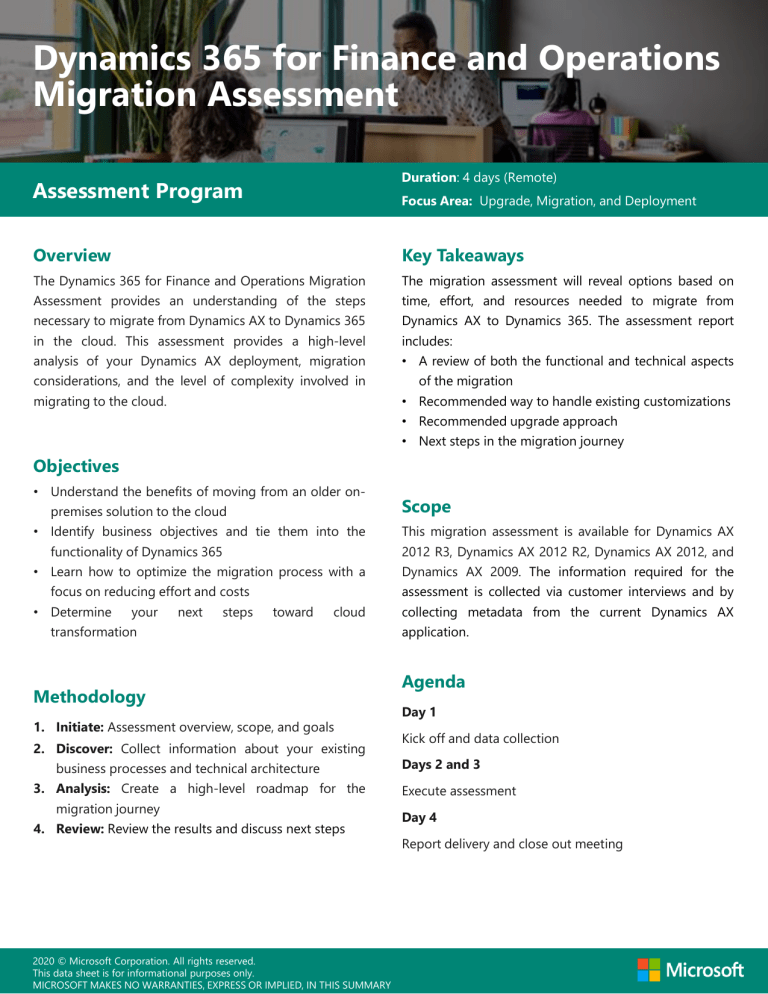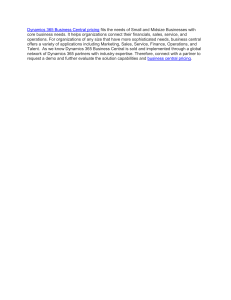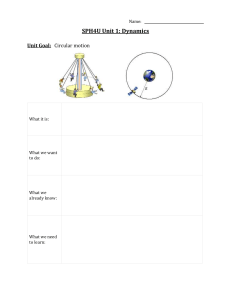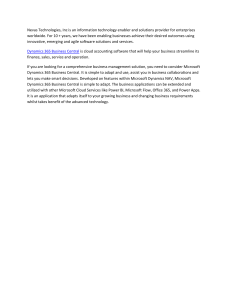1425.Dynamics 365 for Finance and Operations Migration Assessment
advertisement

Dynamics 365 for Finance and Operations Migration Assessment Duration: 4 days (Remote) Assessment Program Focus Area: Upgrade, Migration, and Deployment Overview Key Takeaways The Dynamics 365 for Finance and Operations Migration The migration assessment will reveal options based on Assessment provides an understanding of the steps time, effort, and resources needed to migrate from necessary to migrate from Dynamics AX to Dynamics 365 Dynamics AX to Dynamics 365. The assessment report in the cloud. This assessment provides a high-level includes: analysis of your Dynamics AX deployment, migration • A review of both the functional and technical aspects considerations, and the level of complexity involved in migrating to the cloud. of the migration • Recommended way to handle existing customizations • Recommended upgrade approach • Next steps in the migration journey Objectives • Understand the benefits of moving from an older onpremises solution to the cloud • Identify business objectives and tie them into the functionality of Dynamics 365 focus on reducing effort and costs your next This migration assessment is available for Dynamics AX 2012 R3, Dynamics AX 2012 R2, Dynamics AX 2012, and • Learn how to optimize the migration process with a • Determine Scope steps Dynamics AX 2009. The information required for the assessment is collected via customer interviews and by toward cloud transformation Methodology 1. Initiate: Assessment overview, scope, and goals 2. Discover: Collect information about your existing business processes and technical architecture 3. Analysis: Create a high-level roadmap for the migration journey 4. Review: Review the results and discuss next steps 2020 © Microsoft Corporation. All rights reserved. This data sheet is for informational purposes only. MICROSOFT MAKES NO WARRANTIES, EXPRESS OR IMPLIED, IN THIS SUMMARY collecting metadata from the current Dynamics AX application. Agenda Day 1 Kick off and data collection Days 2 and 3 Execute assessment Day 4 Report delivery and close out meeting Agenda Details Step 1: Assessment kick off • Assessment overview, scope, and goals Step 4: Analysis • High-level assessment of existing customizations and ISV • Review roles and responsibilities • Review assessment steps and required information Step 2: Data collection – functional • Collect information about your existing business processes and how they map to Dynamics 365 solutions • Assess customer models using the LCS code upgrade analysis tool • High-level analysis of migration risks, opportunities, and effort • Create the assessment report capabilities. Step 3: Data collection – technical • Collect information about your current technical architecture and how it maps to Dynamics 365 technical capabilities. Step 5: Assessment close out • Deliver assessment presentation and report • Present summary of results and recommendations • Q&A and discuss migration next steps Focus Areas and Customer Participation Focus Area Kick-off and Introductions Functional Assessment Technical Assessment Assessment Summary Customer Participants • ERP Owner / IT Manager • CXO, ERP Owner / IT Manager, Business Department Leads • ERP Owner / IT Manager • ERP Owner / IT Manager Level of Customer Engagement • Participate on the kick-off call • Identify key participants for the functional and technical assessments • Provide answers to questionnaire • Assist with business process information collection • Provide answers to questionnaire • Assist with technical information collection • Participate in the final presentation • Provide feedback and share expectations on next steps Prerequisites • N/A • Completed questionnaire • Other prerequisite files provided • Completed questionnaire • Other prerequisite files provided • N/A Customer Time Requirement • 1 hour • 2 to 3 hours • 1 hour • 1 to 2 hours For More Information Contact your Microsoft Account Representative for further details. 2020 © Microsoft Corporation. All rights reserved. This data sheet is for informational purposes only. MICROSOFT MAKES NO WARRANTIES, EXPRESS OR IMPLIED, IN THIS SUMMARY



